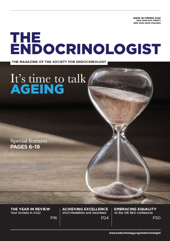Mary Murphy and her son both live with type 1 diabetes. Here, Mary reflects on her differing experiences of care of individuals with the condition between adult and paediatric services.
Ask any diabetes specialist about how they deliver their service today, and they will tell you that they wish they could do better for their cohort: paediatric or adult. As an adult who has had type 1 diabetes for 25 years, diagnosed as an 18-year-old, and now also a parent of a teen with type 1 diabetes, diagnosed when a little 6-year-old, I continuously compare the services.
Through the eyes of a user of an adult service, paediatric services are trying their best to support and treat the whole type 1 diabetes ‘iceberg’. They see the diabetes part, the numbers that define our medical state, and assess our bodies for complications. But they also know to give access to technologies that help improve health outcomes today, so our children can ‘be on an equal playing field’ at school, as well as to listen to the person who has the condition, and the carer who is the ‘force’ that tries (imperfectly) to bring all this together (this is the bit of iceberg that is below the water). They try to help find solutions to manage the things in life that make this already difficult, chronic condition, less so. Their resources are still limited, but they continue to push for what is needed.
In adult services, I feel the delivery and support are provided differently. Being diagnosed in an adult clinic, I looked very different to the others in my waiting room. I didn’t know any better though than to assume (and fear) that my potential destination was the same as all who, unfortunately, have diabetes. Until recently, I hadn’t gained access, through perseverance and grit, to any technologies to help me to look after myself more easily. With these now in my life, and knowing the effort I had to make to advocate for myself, I ask ‘Why is this necessary?’ I am led to believe, based on lack of access, that I am an outlier, that others with type 1 don’t need diabetes technologies and manage well without. Peer support tells me otherwise.
'If we always do what we’ve always done, we’ll always get what we’ve always got.'
With the same support, access to and choice of technologies as paediatric patients, to help us self-manage this condition AND live our busy lives, our potential health destination is not the same as that of the whole diabetes community. We even have the potential to have healthier outcomes than our non-diabetic peers.
What should a service for all who have type 1 diabetes look (and feel) like? I am happy to say that, by volunteering as a service user in the Northern Ireland (Adult) Diabetes Network over the last few years, I have seen what this can look like, on paper, for adult services. It sounds very similar to paediatrics today. More appointments, more choice, more opportunities to talk about management and inter-references, but also psychological support. However, the reality on the ground, right now, is very far from this.
Why is it like this? Does the burden on our lives of having type 1 diabetes not need this support for better health outcomes, like it does in paediatrics? Do we not deserve to have the whole of the type 1 iceberg supported too? The huge, invisible burden of self-managing this condition doesn’t disappear as we grow older.
Clinical care for diabetes focuses on numbers and on treating complications, and holds the keys to our best self-care. Why treat us as diabetes numbers and forget to also support us along our personal journey, with the biggest part of managing type 1? Programming out potentials for worse health outcomes in care pathways is wonderful, but you can’t programme out some types of diabetes. Having any diabetes is so hard, unfair, and not the person’s fault. Treating all who have diabetes as one type, by just looking at numbers, causes so many other things to manifest. It forces the strong with type 1 to educate themselves and to take hold of their own management but, in turn, this penalises them through lack of access to technologies.
Others will advocate for better support and for type 1 diabetes to be seen and its burdens validated. But does this advocacy for better care for type 1 cause harm and shame in our community to those who have type 2 diabetes or any other type, for instance? Should we stop advocating for the care we need? Is treating just diabetes numbers in healthcare the root cause of all this?
See us as you see yourself and your own passions for a long, fulfilling and healthy life; these are ours too. With the right support and technologies, people who have type 1 diabetes are not automatically destined for serious diabetes complications. But having these technologies doesn’t magically make our diabetes disappear. Look to paediatrics to learn how they are ever-improving their care for children who have type 1.
If we always do what we’ve always done, we’ll always get what we’ve always got.
MARY MURPHY







